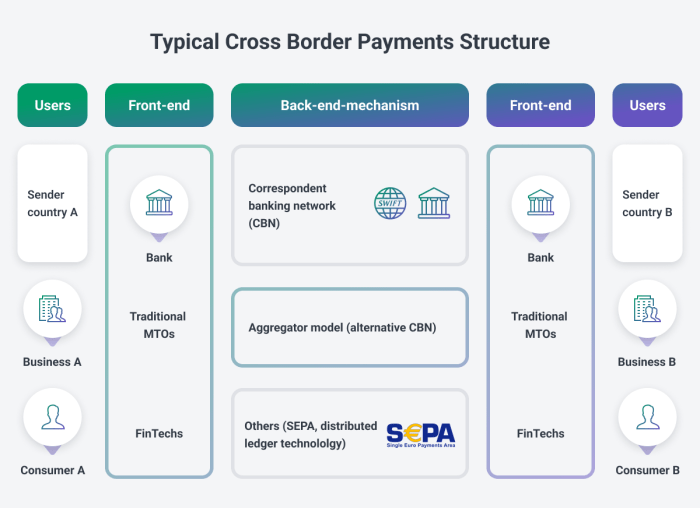Cross-border payments with crypto takes center stage as we delve into the world of international transactions, exploring the benefits and challenges of utilizing cryptocurrency for seamless global financial interactions.
In this comprehensive guide, we will uncover the impact of blockchain technology, compare traditional methods with crypto solutions, identify popular cryptocurrencies for cross-border payments, navigate regulations and compliance, and address security and privacy considerations in this evolving landscape.
Overview of Cross-Border Payments with Crypto

Cryptocurrency has revolutionized the way cross-border payments are conducted, offering a decentralized and efficient alternative to traditional banking systems. By leveraging blockchain technology, crypto transactions can be completed faster and with lower fees compared to conventional methods. However, there are both advantages and challenges associated with using crypto for international transactions.
Advantages of Using Crypto for International Transactions
- Speed: Cryptocurrency transactions can be processed almost instantly, enabling quick cross-border payments without delays.
- Cost-Effectiveness: Crypto transactions typically have lower fees compared to traditional banking systems, making them a cost-effective option for international payments.
- Accessibility: Cryptocurrency transactions can be conducted 24/7, allowing users to transfer funds across borders at any time.
Challenges of Using Crypto for International Transactions
- Volatility: The value of cryptocurrencies can fluctuate rapidly, leading to potential losses if the exchange rate changes during the transaction process.
- Regulatory Uncertainty: Different countries have varying regulations regarding cryptocurrency, creating uncertainty for users engaging in cross-border payments.
- Security Concerns: While blockchain technology is secure, the risk of hacking and fraud still exists in the crypto space, posing a threat to cross-border transactions.
Impact of Blockchain Technology on Cross-Border Payments
Blockchain technology has significantly improved the efficiency and transparency of cross-border payments by enabling secure and immutable transactions. The decentralized nature of blockchain eliminates the need for intermediaries, reducing costs and processing times for international transactions.
Comparison of Traditional Cross-Border Payment Methods with Crypto-Based Solutions
- Traditional methods such as SWIFT transfers are often slower and more expensive compared to crypto transactions, which offer near-instantaneous transfers at lower costs.
- Crypto-based solutions provide greater accessibility and inclusivity for individuals who may not have access to traditional banking services, especially in regions with limited financial infrastructure.
- Blockchain technology ensures transparency and traceability in cross-border payments, offering a level of security and trust that traditional methods may lack.
Popular Cryptocurrencies for Cross-Border Payments: Cross-border Payments With Crypto

Cryptocurrencies have emerged as a popular choice for cross-border payments due to their decentralized nature and potential for faster transactions at lower costs compared to traditional payment methods.
Top Cryptocurrencies for International Transactions
- Bitcoin (BTC): As the first and most well-known cryptocurrency, Bitcoin is widely accepted and used for cross-border payments.
- Ethereum (ETH): Known for its smart contract capabilities, Ethereum is also commonly used for international transactions.
- Ripple (XRP): Ripple is specifically designed for facilitating cross-border payments and is favored by financial institutions for its speed and low fees.
Criteria for Selecting a Cryptocurrency for Cross-Border Payments
- Transaction Speed: The cryptocurrency should offer fast transaction times to ensure timely cross-border payments.
- Transaction Fees: Low transaction fees are essential to keep costs down for international transactions.
- Acceptance and Liquidity: The cryptocurrency should be widely accepted and have high liquidity to ensure seamless transactions across borders.
Liquidity and Stability of Cryptocurrencies in Global Transactions
Cryptocurrencies with high liquidity and stability are preferred for cross-border payments as they minimize the risk of price volatility during transactions. Stablecoins, pegged to fiat currencies or commodities, offer stability and are increasingly used for international payments due to their fixed value.
Role of Stablecoins in Facilitating Cross-Border Payments
Stablecoins play a crucial role in cross-border payments by providing a stable value that is not subject to the same price fluctuations as other cryptocurrencies. This stability makes them a reliable option for businesses and individuals looking to transfer funds internationally without worrying about market volatility.
Regulations and Compliance in Cross-Border Crypto Payments
When it comes to cross-border crypto payments, navigating the regulatory landscape is crucial for businesses looking to engage in international transactions. Compliance with various regulations is vital to ensure smooth operations and avoid legal implications.
Regulatory Landscape for Cross-Border Crypto Transactions
Understanding the regulatory environment governing cross-border crypto transactions is essential for businesses operating in this space. Different countries have varying approaches to regulating cryptocurrencies, which can impact how transactions are conducted.
- Some countries have embraced cryptocurrencies and have clear regulations in place to govern their use in cross-border payments.
- Other countries have taken a more cautious approach, imposing strict regulations or outright bans on crypto transactions.
- The lack of uniformity in regulations across jurisdictions can pose challenges for businesses looking to facilitate cross-border crypto payments.
Compliance Requirements for Businesses in International Crypto Payments, Cross-border payments with crypto
Businesses engaged in international crypto payments must adhere to specific compliance requirements to ensure regulatory alignment and mitigate risks associated with money laundering and terrorism financing.
- Implementing robust Know Your Customer (KYC) and Anti-Money Laundering (AML) procedures is essential to verify the identities of parties involved in transactions.
- Maintaining detailed transaction records and reporting mechanisms to regulatory authorities is necessary to demonstrate compliance with relevant regulations.
- Regular monitoring of transactions and conducting risk assessments can help businesses identify and address potential compliance issues proactively.
Challenges Associated with Regulatory Compliance in Different Jurisdictions
Navigating regulatory compliance in different jurisdictions can present several challenges for businesses engaged in cross-border crypto payments. These challenges can include:
- Interpreting and complying with diverse regulatory frameworks across multiple countries.
- Dealing with evolving regulatory requirements that may impact the operational processes of businesses.
- Managing legal uncertainties and potential conflicts between local and international regulations.
Impact of Regulatory Changes on Adoption of Crypto for Cross-Border Payments
Regulatory changes can significantly impact the adoption of cryptocurrencies for cross-border payments. Businesses and users may alter their strategies and preferences based on regulatory developments, which can influence the overall acceptance and usage of crypto in international transactions.
- Positive regulatory changes that provide clarity and support for crypto payments can boost adoption rates and increase trust among users.
- Negative regulatory developments, such as bans or stringent restrictions, can hamper the growth of cross-border crypto payments and discourage businesses from leveraging digital assets for international transactions.
Security and Privacy Considerations in Cross-Border Crypto Transactions

Cryptocurrency transactions across borders come with a set of security and privacy considerations that need to be addressed to ensure the safety of funds and user information.
Security Measures in Cross-Border Crypto Payments
- Utilization of secure wallets: Cryptocurrency wallets play a crucial role in securing funds during cross-border transactions. Hardware wallets, paper wallets, or secure software wallets with strong encryption are commonly used to safeguard digital assets.
- Two-factor authentication (2FA): Implementing 2FA adds an extra layer of security to crypto transactions, making it harder for unauthorized users to access accounts and initiate payments.
- Smart contract security: Many cross-border crypto transactions rely on smart contracts to automate and secure the transfer process. Ensuring the integrity and security of smart contracts is essential to prevent vulnerabilities and potential attacks.
Privacy Concerns in Cross-Border Crypto Transactions
- Pseudonymity: While cryptocurrencies offer a certain level of privacy due to the use of pseudonymous addresses, transactions are recorded on a public blockchain, potentially exposing user identities and transaction history.
- Data leakage: In some cases, the use of centralized exchanges or third-party services for cross-border payments may result in the leakage of sensitive user data, compromising the privacy of individuals involved in the transaction.
Role of Encryption and Blockchain Technology
- Encryption: Cryptographic techniques such as encryption are fundamental to securing cross-border crypto payments. End-to-end encryption ensures that sensitive information remains confidential during the transaction process.
- Blockchain technology: The decentralized and immutable nature of blockchain technology provides a high level of security for cross-border payments. Transactions are recorded on a distributed ledger, reducing the risk of fraud or tampering.
Risks and Vulnerabilities in Cross-Border Crypto Transactions
- Exchange hacks: Centralized exchanges are common targets for cyber attacks, leading to the loss of funds and sensitive user data. Choosing reputable exchanges with robust security measures is crucial to mitigate this risk.
- Regulatory challenges: Compliance with varying regulatory frameworks across different countries poses a challenge for cross-border crypto transactions. Lack of clarity in regulations may expose users to legal risks and uncertainties.
In conclusion, the realm of cross-border payments with crypto offers a glimpse into a future where financial borders blur and transactions become more efficient and secure. As the industry continues to evolve, staying informed about the latest trends and regulations is crucial for businesses and individuals venturing into this digital frontier.
When it comes to the best cryptocurrencies to invest in, it’s essential to do thorough research to make informed decisions. Some popular options include Bitcoin, Ethereum, and Binance Coin. Each coin has its unique features and potential for growth. To learn more about the best cryptocurrencies to invest in, check out this article.
Choosing the right cryptocurrency exchange is crucial for trading digital assets securely. Platforms like Binance, Coinbase, and Kraken are among the top choices for traders worldwide. It’s essential to consider factors like security, fees, and user experience when selecting an exchange. To explore more about cryptocurrency exchanges, visit this link.
Protecting your digital assets is paramount in the world of cryptocurrencies. A reliable cryptocurrency wallet is a must-have for storing and managing your coins safely. Popular wallets like Ledger Nano S, Trezor, and Exodus offer secure storage solutions for various cryptocurrencies. To discover more about cryptocurrency wallets, click on this link.




